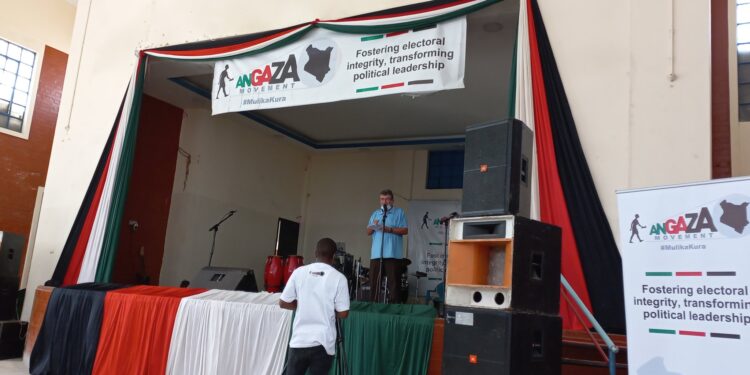As the elections in Kenya approach, several civil society groups and human rights defenders have expressed concern about the state of preparedness of poll management institutions.
The bulk of their concern was about the Independent Electoral and Boundaries Commission, and whether it is capable of delivering free and fair elections slated for later this year given its current shortcomings and unsatisfactory past performance.
“The underwhelming performance of the Independent Electoral and Boundaries Commission (IEBC) in the ongoing registration of voters, compounded with a perennially problematic voters register does not inspire confidence that the election will be free, fair, or credible,” the organisations, under the umbrella of The Angaza Movement (TAM), said in a statement issued on January 27, 2022.
The movement accused the IEBC of deliberately refusing to learn from the dismal performance of the countrywide voter registration last year, expressing concern that the electoral body did not seem interested in finding out the cause for the low number of new voters in the first round before launching the second one.
“There is no evidence that it has engaged the National Registration Bureau to satisfy itself that the delayed release of identification documents is not suppressing voter registration,” TAM said.
The civil society organisations were also concerned that voter registration is being carried out without any civic education and awareness.
The movement stated that the IEBC has ignored many of the legal and administrative changes the Supreme Court suggested in 2017 after nullifying the presidential election results citing irregularities, among them the tabulation procedure, which it said had failed to fulfil constitutional requirements.
The commission’s capacity to manage the elections also came into question, with the movement citing a large number of vacancies.
“The IEBC is hollowed out, and bereft of institutional memory because of unfilled vacancies in the commission and the secretariat,” TAM said.
The electoral management body has operated without a quorum for three years after four of its six commissioners resigned during and shortly after the 2017 elections. In 2018, IEBC Chairman Wafula Chebukati said the commission was unable to hold plenary meetings since it lacked quorum, but would continue its other administrative duties.
However, in September 2021, President Uhuru Kenyatta approved the appointment of four new commissioners after they were successfully vetted.
Angaza was also concerned that many of the individuals who had left the electoral management body in disgrace have been appointed to sensitive positions that could affect the conduct of the elections.
The movement blamed some of IEBC’s woes on the government, which it accused of refusing to adequately and timeously fund the electoral management body, as well as frustrating it by denying it the opportunity to receive funding from development partners.
The state was also accused of delaying vital IEBC appointments and making last-minute changes to the law that could be interpreted as being aimed to “destabilise the context in which elections will be held”.
Parliament recently amended the Political Parties Act of 2011 by introducing the concept of coalition political parties, outlining its functions as well as changing the criteria of accessing the Political Parties Fund.
The law, which was opposed by several MPs, empowers the Registrar of Political Parties to certify political party membership lists and nomination rules, ostensibly as a way of strengthening the management of political parties and enhancing democracy.
The movement pointed out that the security situation in the country was a threat to the delivery of a credible, free, and fair election. It cited the violence in Baringo, Laikipia, and Lamu counties, as well as frequently reported extrajudicial killings, forced disappearances, “and a general breakdown in police discipline”.
The movement noted that past elections have been determined by the use of violence against women and other vulnerable groups to curtail their participation, with no accountability for sexual and gender-based crimes. “There can be no free or fair election in a violent environment ring-fenced by impunity,” said the statement.
The organisations objected to the continued defying of the efforts by the Constitution and the courts to promote the inclusion of women, youth, and persons living with disabilities in election processes in order to promote free, fair, and credible polls, and named the IEBC, political parties, the legislature, and the executive as the biggest culprits.
Another thorny issue is the failure of the IEBC and other state agencies to uphold and enforce integrity and leadership standards, as outlined in Chapter Six of the Constitution. TAM accused the electoral management body of failing or refusing to underwrite democracy in political parties by requiring them to meet the constitutional requirements of transparency and accountability in their political processes.
“IEBC and other institutions have bowed to political interests that suppress the good of the people, their safety, security, and democracy,” the movement further stated. “We are calling on every Kenyan citizen to do that which the IEBC and other state institutions have failed to do: Put integrity at the head of this election.”
Kenyans go to the polls on August 9 to elect their fifth president as well as members of Parliament, county governors, and members of county assemblies.







